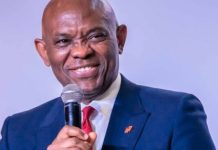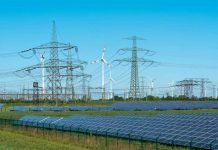The Nigerian Communications Commission (NCC), based on calculations by the Nigeria Bureau of Statistics (NBS), reported that the telecommunications sector’s contribution to the country’s Gross Domestic Product (GDP) increased significantly to 16% in the second quarter of 2023.
This was said by Prof. Umar Danbatta, the Executive Vice Chairman of the NCC, in his keynote address at the annual Telecom Executives and Regulators Forum (TERF), held by the Association of Telecom Companies of Nigeria (ATCON), on Thursday in Lagos.
The telecoms sector increased its contribution to the national GDP by 16 percent in the second quarter of 2023, breaking the previous record of 15 percent established in the second quarter of 2022, according to Danbatta, up from a contribution of 14.13 percent in the first quarter of 2023 and up from the previous 15 percent all-time high contribution.
Danbatta, while speaking on the theme: “Success Factors and Barriers to National Broadband and Digital Economy Aspirations”, took the audience, promising executives of telecom companies and other industry stakeholders, through the giant strides being made by the Commission.
Danbatta, the EVC of NCC, stated that quarterly GDP has greatly increased to achieve its current level of 16 percent and that this has continued to favorably impact all parts of the economy from an 8 percent contribution to GDP in 2015 when he first joined the organization.
“Through sustained regulatory excellence and operational efficiency by the Commission, the industry has grown in leaps and bounds over the past two decades and this has impacted on all other sectors of the economy. The effective regulatory regime employed by the NCC and with the support from all stakeholders has been our major success factor as an industry,” Danbatta said.
The EVC stated that while there are barriers to broadband deployment in the country, ranging from the issue of right of way (RoW), fiber concerns, a high capital requirement for deployment, multiple taxes, and regulations, among other challenges, the NCC is navigating regulator complexities, the digital divide and literacy, security concerns,and increased collaborations with necessary stakeholders such as ATCON to create measures towards tackling the challenges.
Regarding the RoW dilemma, the EVC stated that now there are around 46 various taxes aimed at the telecom industry. Some agencies and levels of government, particularly at the state and local levels, impose these fees and rates on telecom carriers under a variety of titles. Danbatta claimed that the difficulty results in additional financial obligations for telecom subscribers in the country.
Speaking about connectivity, Danbatta said, “Over the years, we have identified some clusters of access gaps all over the country but we have recorded a significant drop in the number of access gaps, as we continue to drive initiatives that boost access to telecommunications services.”
According to him, the Commission achieves this by securing support from the government for a digital economy with strong policy frameworks, encouraging investment and funding, stimulating infrastructure development, promoting digital inclusion and literacy, encouraging competition and market liberalization, allocating spectrum in an efficient manner, and fostering the e-government ecosystem.
Danbatta said with various ongoing regulatory efforts, “The NCC is confident that we are going to reach 50 per cent broadband penetration threshold by the end of 2023 and by 2025, we would have met and possibly surpassed the 70 per cent broadband penetration target, as contained in the Nigerian National Broadband Plan (NNBP), 2020-2025.”
The ATCON and its members received special praise from the EVC for being active participants in progress and for consistently collaborating with the Commission in positive ways to address the many issues facing the sector. A robust digital economy and a nationwide broadband network are not without difficulties, according to the EVC.
“However, these challenges can be overcome through determination, innovation, and strategic planning. By focusing on the success factors and addressing the barriers, we can create a future where every Nigerian has access to the opportunities that the digital world offers,” he added.
Furthermore, according to Danbatta, the success of the country’s digital aspirations goes beyond technological development and focuses on improving lives, fostering economic growth, and maintaining a country’s competitiveness on the international stage.
“As we work together to navigate this path, I enjoin all our stakeholders in the public and private sectors to remain committed to building a brighter and more connected future for our country,” he said.


























